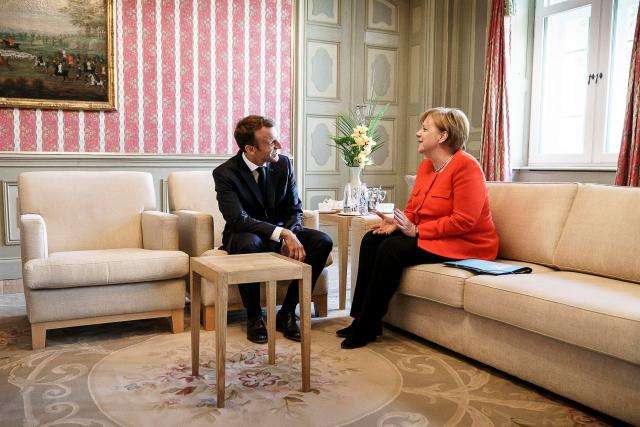Their meeting, to prepare for an EU summit on June 28-29, had been dubbed a “moment of truth” for bilateral relations by France’s finance minister, as Paris has pressed Berlin for months to agree reforms to crisis-proof the bloc.
After meeting at Chancellor Angela Merkel’s Meseberg retreat outside Berlin, she and France’s Emmanuel Macron presented the new budget as a means of boosting the bloc’s economic competitiveness.
Macron said it would be operational by 2021, but their plans lacked further detail.
“We are opening a new chapter,” Merkel said after the talks, which produced an eight-page declaration entitled: ‘Renewing Europe’s promises of security and prosperity’.
Merkel said the budget would be used to strengthen economic convergence within the euro zone, which was almost torn apart by a debt crisis that took hold in 2009.
“We know that an economic and monetary union can only remain intact if economic policies converge,” she said, adding that euro zone reform was the toughest issue in the talks, which also touched on European foreign and defense policy and immigration.
French President Macron, who last September laid out a sweeping vision for euro zone reform, defended the agreement when pressed by journalists.
“It will be a real budget, with annual revenues and spending,” he said. “This is a political commitment we make together which will require technical work at the ministerial level by the end of the year, and then indispensable treaty change the year after.”
The two leaders had decided to focus on broad issues to leave more room for negotiations with the other 17 euro members, Macron said - a scenario that leaves scope for the plans to be watered down.
National contributions and European resources would be used to fund the budget, the leaders said in the declaration. Macron said its size and details on its financing would be hammered out by ministers before the end of the year.
European Commission President Jean-Claude Juncker called the plans “very well balanced”.
“I am very pleased with the German-French paper. It allows European progress and the Commission is very pleased with what is being developed,” he told Reuters.
“EXISTENTIAL CHALLENGES”
While Europe’s economy has picked up and there is no immediate sign of financial stress, many analysts say reforms are needed to protect the single currency.
Merkel said she was optimistic her government and parliament would back the proposed reforms.
However, her political capital is being eroded by a row with her Bavarian allies, who have given the chancellor two weeks to find a European solution to their immigration dispute.
The row threatens to scupper Merkel’s three-month-old coalition and limits her capacity for agreeing to far-reaching euro zone reforms, of which many in her conservative bloc are skeptical.
While Europe’s economy has picked up and there is no immediate sign of financial stress, many analysts say reforms are needed to protect the single currency.
Merkel said she was optimistic her government and parliament would back the proposed reforms.
However, her political capital is being eroded by a row with her Bavarian allies, who have given the chancellor two weeks to find a European solution to their immigration dispute.
The row threatens to scupper Merkel’s three-month-old coalition and limits her capacity for agreeing to far-reaching euro zone reforms, of which many in her conservative bloc are skeptical.
Keen not to increase burdens on German taxpayers, Merkel has indicated she would prefer a euro zone budget in the “tens of billions” rather than Macron’s idea of hundreds of billions of euros for investments.
Noting in their declaration that “the EU faces existential challenges”, the leaders agreed to set up a European border police and to create a European asylum office.
But they failed to deliver any big-bang reforms, and soft-pedalled on the idea of a European insurance scheme (EDIS) for bank deposits.
“Everything depends on the details that are not yet known,” Guntram Wolff, director of the Brussels-based think tank Bruegel, said of the reform plans.
“But without finishing the banking union, the euro area will remain fragile,” he told Reuters.
















































